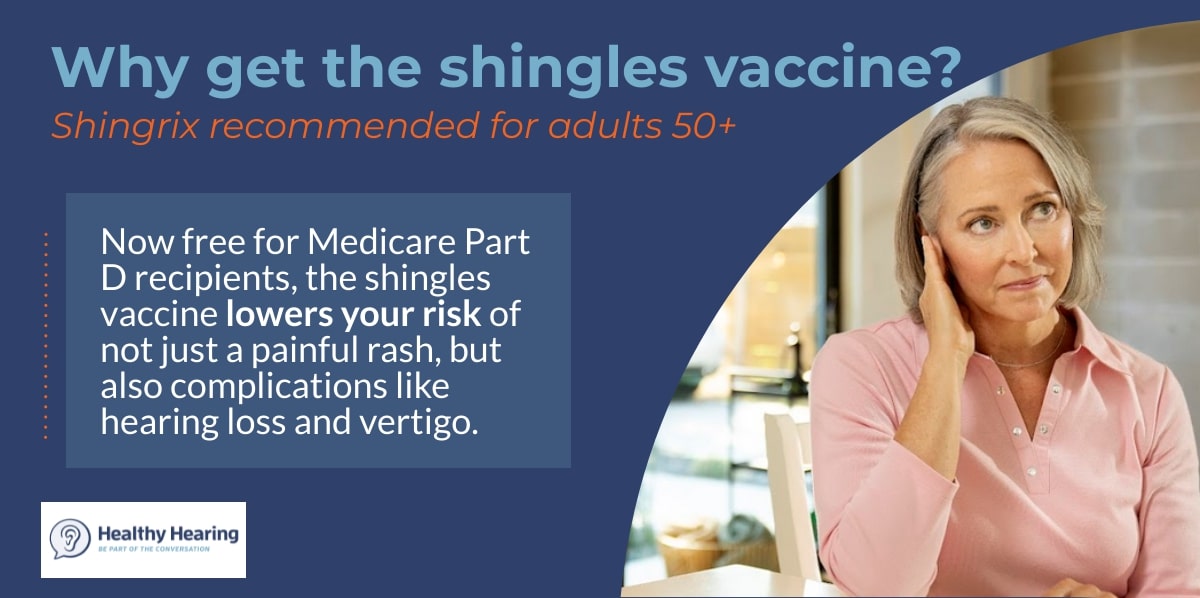|
www.HealthyHearing.com |
Shingles and hearing loss: What we knowMedicare widens access to Shingrix vaccine, which lowers risk of complications
Contributed by Linda Childers When most people think of shingles, they envision a painful and itchy body rash, yet the shingles virus also can affect hearing and balance, and in some cases, lead to hearing loss. When shingles does affect hearing and balance, it typically presents as one of two different disease pathways:
“Not everyone with shingles gets hearing loss,” says Dr. Angela Shoup, PhD, FAAA, FNAP, executive director of The Callier Center for Hearing Disorders at The University of Texas at Dallas and past president of the American Academy of Audiology. “Ramsay Hunt syndrome can occur as a complication of shingles that causes facial weakness and paralysis, a rash around the ear, and hearing loss or dizziness.”
Vaccination dramatically lowers riskContracting shingles as an adult isn’t inevitable and according to Shoup, getting vaccinated with the shingles vaccine, Shingrix, provides protection against both shingles and its complications. The Centers for Disease Control and Prevention (CDC) notes immunity from the Shingrix vaccine stays strong for at least seven years after vaccination. Two doses provides more than 90% protection against shingles and postherpetic neuralgia, a complication. In adults with weakened immune systems, the vaccine was 68%-91% effective in preventing shingles. Shingrix now available at no cost to Medicare Part D recipientsAdults ages 50 and older should get two doses of Shingrix, two to six months apart. In the past, the cost of the vaccine was a barrier for some people. The good news? As of January 1, 2023, Shingrix is now free for almost everyone. While patients with private health insurance typically pay no out-of-pocket costs for the vaccine, people with Medicare Part D coverage also will be able to get the shingles vaccine at no charge, thanks to the Inflation Reduction Act of 2022. What is shingles?Shingles is a serious viral infection that affects adults ages 50 and over. Shoup says the virus is caused by the varicella-zoster virus, the same virus that causes chickenpox. The disease can remain dormant for many years in those who experienced chickenpox as a child. People who were vaccinated against chickenpox as children can also get shingles. It's common, too. According to the CDC, 1 out of every three people in the U.S. will develop shingles in their lifetime. Shingles symptomsTypically, shingles will develop as a painful rash on one side of the body or face in the first 4-5 days of the onset of infection. It usually takes 3-5 weeks to recover, although it can vary from one person to the next. Many people experience pain, tingling, or itching, several days before the shingles rash appear, the CDC notes. In addition to a rash, other symptoms of shingles include fever, chills, headache, and an upset stomach. Other symptoms can include dizziness and vertigo (a feeling that your surroundings are spinning or moving) and tinnitus (hearing abnormal sounds). However, the disease sometimes can be tricky to diagnose: Some patients have nerve pain, but not the signature shingles rash. Shingles without a rash is known as internal shingles. This nerve pain can linger for a long time, known as postherpetic neuralgia. Complications from shinglesShoup says that immunocompromised patients are at a higher risk of developing shingles complications such as Ramsay Hunt syndrome (herpes zoster oticus). Other factors that increase the chances of developing Ramsay Hunt include stress, chemotherapy, infection and malnutrition. While Ramsay Hunt isn’t contagious, Shoup says reactivation of the varicella-zoster virus can cause chickenpox in those who previously haven’t had the virus, as well as those who haven’t been vaccinated. “For this reason, people with an active case of shingles should avoid being around those who are immunocompromised or who haven’t had chickenpox,” she says. In extreme cases, shingles can travel through into the brain and spinal cord and cause stroke or inflammation of the brain's lining (meningitis). Shingles is one of many viruses infections that can lead to hearing damage. Other examples include mumps, the common cold, and even COVID-19. As with shingles, many of these infections are preventable with vaccination. Timely treatment is keyShoup says patients who experience shingles, along with a painful red rash and blisters on or around one ear, facial paralysis, vertigo, or hearing loss, should consult their doctor within three days of the onset of symptoms. “Facial paralysis and a rash affecting the ear don’t always occur at the same time,” Shoup cautions. “For this reason, those with shingles experience hearing problems either with or without facial paralysis, should see a doctor. She notes that Ramsay Hunt syndrome is treatable with antiviral medication and anti-inflammatory drugs to relieve pain. In more severe cases, patients may be prescribed steroids. Shingles and hearing lossWhile Shoup says most cases of hearing loss associated with Ramsay Hunt syndrome are temporary, patients may experience permanent muscle weakness or hearing loss in cases where they don’t seek prompt medical care. The hearing loss is usually in just one ear. If Ramsay Hunt syndrome results in permanent hearing loss, hearing aids can improve hearing in those with sensorineural hearing loss, caused by damaged nerves. One study found that patients with Ramsay Hunt experienced hearing loss that was more severe in the high-frequency range than in the low-frequency range and that hearing loss was more severe in patients with vertigo. According to the National Organization for Rare Disorders, Ramsay Hunt affects 5 out of every 100,000 people, although Shoup says the number may be higher, since some cases aren’t reported. One study found that rates of shingles may be underreported, due to the difficulty of diagnosis in patients who don't develop a rash. More: One woman's story of hearing loss due to Ramsay-Hunt syndrome |
Featured clinics near me
Hearing Health Solutions from Ohio ENT - Columbus
974 Bethel Rd Ste B
Columbus, OH 43214
Earzlink Hearing Care - Reynoldsburg
7668 Slate Ridge Blvd
Reynoldsburg, OH 43068


Find a clinic
We have more hearing clinic reviews than any other site!


